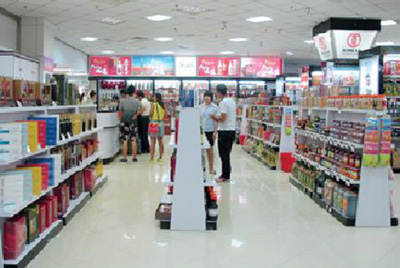|
 |
|
A BITE OF TAIWAN: A store sells various Taiwanese food in the Dadeng Town market (ZHOU XIAOYAN) |
Besides, more preferential policies successively came out for facilitating development of the market in Dadeng. In 1999, for instance, the Xiamen Municipal Government issued a regulation for the market—total trade of imported Taiwanese goods less than 1,000 yuan ($157) would enjoy a duty-free policy. In 2007, the approved standard rose to 3,000 yuan ($472). The move has largely stimulated trading activities.
The Xiamen Municipal Government then decided to renovate and expand the market and strengthen administration, expecting that it'll become the biggest park and industrial base for trade and tourism across the Straits.
On September 6, 2011, the new Dadeng market, namely Dadeng Town, was inaugurated, marking a new era of the trade history between the Chinese mainland and Taiwan.
By the end of 2011, Dadeng Island had imported $196.96 million worth of Taiwanese commodities, according to the Information Office of the Xiamen Municipal Government.
The Dadeng Town market is expected to receive 2 million consumers, with the sales volume of Taiwanese commodities amounting to $60 million by 2012, according to Xiangyu Group, a Xiamen-based enterprise responsible for the Dadeng Town program.
Targeting the future
About 80 percent of the products in the new market come from the central and southern parts of Taiwan, the heart of the island's manufacturing base. The new market is slated to help Taiwanese expand their businesses and give mainland citizens a chance to buy authentic Taiwanese commodities at lower prices, said Chen Chunhui, Deputy General Manager of Xiangyu Group.
A symbol of people-to-people exchanges across the Taiwan Straits, the new market can give more small and micro Taiwanese companies a chance to survive and develop on the mainland, and even a chance to live a quite happy life here. "We can proudly say the essence of cross-Straits exchanges lies here in this market," said Chen.
After several rounds of bidding, Liu Wen-chung got a three-year valid authorization to sell authentic souvenirs of the Taipei-located "National Palace Museum."
Different from other authorized souvenir shops in Taipei, where souvenirs imitating Jadeite Cabbage, one of the most famous works on display at the museum, are the most popular, calligraphy and painting works are the most demanded products here, said Liu. "Tourists and Xiamen locals would drive to the market to buy the calligraphy and painting works at weekends."
After a sea tunnel connecting Xiamen to Dadeng Island was opened, travel time has been halved to only 30 minutes.
"The business is not so good right now because this market was newly opened in September 2011, but I remain confident in the future of it," said Liu.
"Opening a new market place for real, authentic and quality goods are beneficial for us authorized sellers. We don't sell shabby and counterfeited products and consumers are likely to gradually transfer from the old market to the new one," said Liu.
"We only sell 100-percent natural stones, such as crystal, amber and jade, and I make it a point to teach consumers how to tell the difference between natural products and fakes," said Wang. "It's one of our ways of winning over customers: with trust and loyalty."
Although business in the new market has been mediocre at best, Wang is quite confident in its prospects.
"I've invested over 5 million yuan ($785,500) in this store and it has yet turned into profit. However, when evaluating a market, you should see the future," said Wang.
"Anyone with any business sense can predict that this marketplace is bound to prosper in the near future," he said.
Email us at: zhouxiaoyan@bjreview.com | 